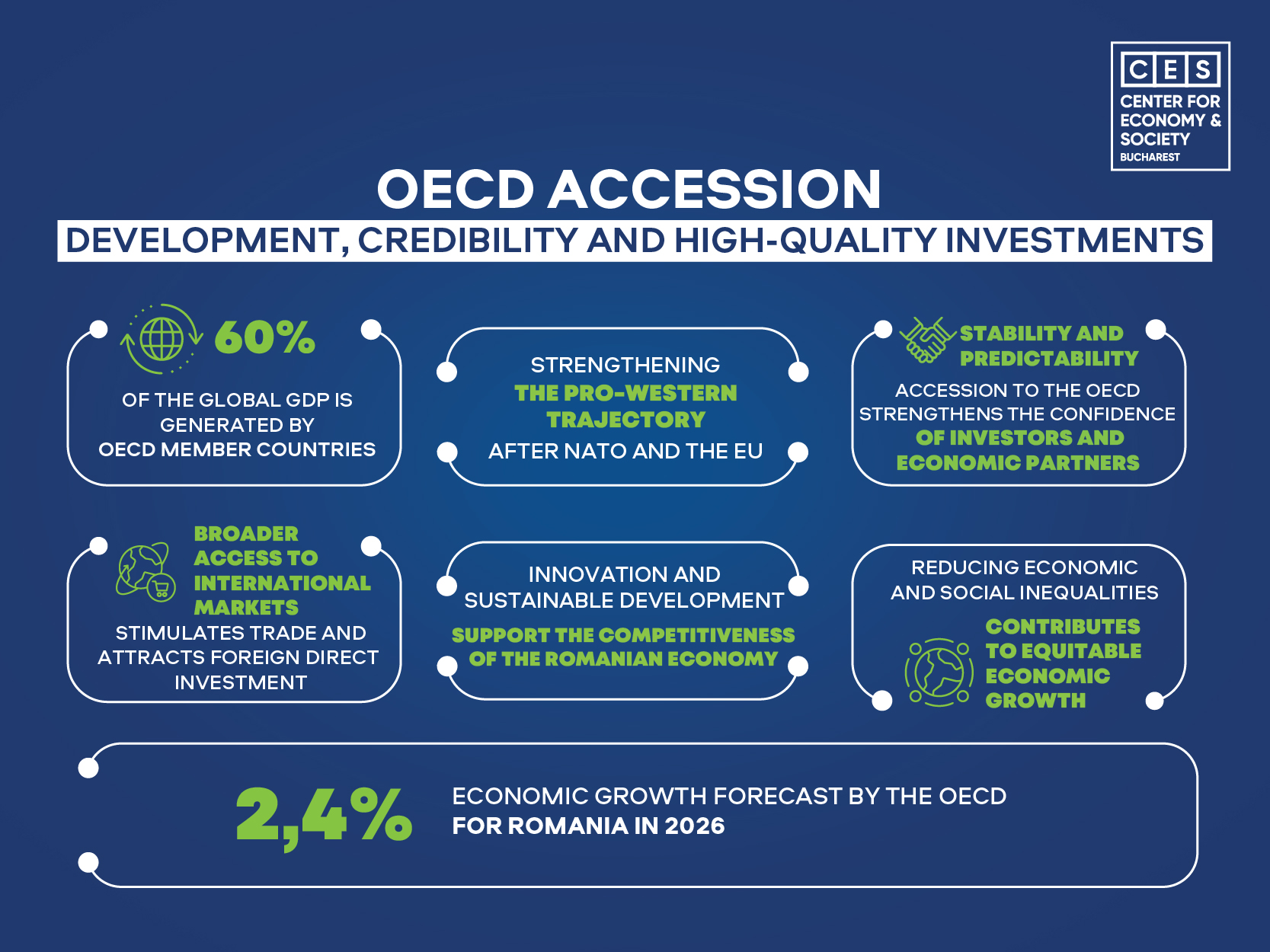CES Bucharest Analysis: OECD Accession – Development, Credibility and High-Quality Investments

OECD member countries generate approximately 60% of global GDP
Romania is in a favourable moment in its international trajectory, currently in the process of joining the Organisation for Economic Co-operation and Development (OECD) — a step comparable in significance to its 2007 accession to the European Union. Joining the OECD, often referred to as an “exclusive club” of best practices in economic governance, is not merely a symbolic objective, but one that carries direct and profound implications for Romania’s business environment and the national economy as a whole.
The OECD, through its 38 member states — including the United States of America, Japan and Australia — and its key partners, represents around 70% of global production and trade, as well as 90% of global foreign direct investment[1]. Currently, OECD member countries generate approximately 60% of the world’s gross domestic product[2].
Therefore, Romania’s accession to the OECD is not only a recognition of its economic progress but also a significant opportunity for sustainable economic growth — with a direct, positive impact on the business climate.
Romania’s accession represents a key step in consolidating its position on the global economic stage.
OECD accession brings a wide range of benefits, from attracting foreign direct investment to boosting national competitiveness through innovation and sustainability. OECD accession will also strengthen Romania’s Western trajectory, given that the country is already a member of NATO and the EU, in an uncertain geopolitical and security context marked by war at its borders and global trade fragmentation. This strategic anchor sends a clear signal of stability and predictability, reinforcing investor and partner confidence.
Moreover, the organization encourages innovation and sustainable development — both essential for Romania’s long-term competitiveness. At the same time, OECD policies aim to reduce economic and social inequalities, contributing to fairer and more inclusive economic growth.
Joining the OECD also entails implementing more effective public policies in key areas such as education, healthcare, and labor markets, which will help improve quality of life and strengthen human capital.
The OECD also highlights several structural priorities for Romania: improving labor force skills and mobility, tackling poverty, and supporting SMEs through better access to finance and rule-based entrepreneurial ecosystems.
Equally important, the OECD promotes green transition and energy security, viewing decarbonization as a driver of competitiveness. Policies aimed at reducing dependence on fossil fuels and increasing green investments attract high-quality capital and stimulate industrial innovation.
Romania’s OECD accession process began on January 25, 2022. On June 10 of the same year, the Accession Roadmap was adopted, setting out the evaluation steps and conditions across 26 committees and working groups. In 2024, Romania received several formal approvals from OECD committees, including in areas such as budget, regional development policy, and shipbuilding.
According to an OECD report published in March 2024, Romania continues to face significant economic challenges. In the short term, the OECD forecasts an economic growth rate of 1.5% in 2025, followed by a recovery to 2.4% in 2026. In the current geopolitical context, uncertainty remains high, and priorities must include reducing inflation and managing public debt effectively.
Romania is currently being evaluated by 26 OECD technical sectoral committees, which are assessing its legislation, policies and practices against the organization’s legal standards and instruments. The estimated timeline for completing the accession process is 2026.
Become a CES Bucharest member
A better future is everyone’s business. Be part of that change!
or call +40 723 260 790
MY CES
Subscribe to CES Newsleeter to receive research news & updates
By clicking ‘Subscribe’ you agree to our Terms of Use . For further information about how the CES Bucharest processes your personal data, please click on our Privacy Policy .


